Behind the News
Behind the News: All the backstories to our major news this week
Published
7 months agoon

Over the past week, there were lots of important stories from around the African continent, and we served you some of the most topical ones.
Here is a rundown of the backstories to some of the biggest news in Africa that we covered during the week:
1. Nigeria’s Presidency walks back UNGA goof
President Bola Tinubu’s participation at the 78th United Nations General Assembly (UNGA) would have ended on a high but for an unpardonable blunder by Presidential spokesman, Ajuri Ngelale’s describing the epoch NASDAQ Bell ringing by Tinubu as the first by an African leader.
Perhaps in his enthusiasm to please the President of Africa’s most popular country, Ngelale had rushed to release the statement where he announced that President Tinubu was the first African leader to ring the bell at the close of trade at the NASDAQ in the United States.
Tinubu had, on Wednesday, rang the closing bell at the NASDAQ headquarters in New York City on the sidelines of the UNGA, and used the opportunity to advance his foreign investment push in front of financial markets at the famous stock exchange.
“The world’s second largest stock exchange, the National Association of Securities Dealers Automatic Quotation System (NASDAQ), on Wednesday in the world’s financial capital, invited President Tinubu to ring the closing bell. Making him the first African President to ever receive the honour,” Ngelale said.
The statement led to Nigerian journalists doing fact-checks which turned out that Tinubu was not the first African leader to ring the NASDAQ Bell and with the outcome came serious backlash for the Presidency, leading to Ngelale tendering an apology for the goof.
“We inadvertently referred to President Bola Tinubu as the first African leader to ring the bell at NASDAQ on Wednesday in New York, based on the information provided by a third-party event organiser.
“We have since found out that this information was/is incorrect as a former African leader has indeed had the privilege. This error is sincerely regretted,” he said.
This is not the first time Ngelale will have eggs rubbed on his face due to his misrepresentation of facts.
The first was during a meeting between Tinubu and his United Arab Emirates’s counterpart, Mohamed bin Zayed Al Nahyan in Abu Dahbi, shortly after thr G-20 Summit held in India.
After the meeting, Ngelale issued a where he said that Tinubu and Al Nahyan had “finalised a historic agreement, which has resulted in the immediate cessation of the visa ban placed on Nigerian travellers.”
By the statement, Ngelale claimed that had claimed that a visa ban on Nigerians by the UAE had been lifted.
However, the UAE authorities immediately rubbished the claim, saying there was no agreement to the effect that the visa ban had been lifted.
In an interview with the CNN, an official of the Arab country knocked Ngelale’s claims, saying the two countries were still working on modalities to “reinforce their ties and explore opportunities for further bilateral collaborations.”
After he was caught in a web of lies, Ngelale did a volte face by putting up a statement where he said officials from the two countries were still in the process of finalising details on reversing the visa ban.
“Given the agreement struck between the two Heads of State, there is need to allow cabinet officials from both sides to work out the finer details and finalize the cross-sectoral agreements.”
“Everyone can now allow the process to work itself out organically, devoid of speculation,” he had said.
2. Sudan’s Army Chief, Gen. Al-Burhan talks up peace negotiations
After over five months of stand off and posting an uncompromising stance, Sudan’s Army Chief, Gen. Abdel Fattah Al-Burhan, says he is now ready for peace talks aimed at bringing the civil war in the country to an end.
Before now, Al-Burhan and his rival, Gen. Mohamed Hamdan Dagalo, the leader of the Rapid Support Force (RSF) paramilitary had rebuffed every attempt by African leaders and the international community to see reasons why the bloody war that has consumed thousands of civilians and equally displaced millions.
Talks brokered by Saudi Arabia and the United States held in Jeddah were stalled due to the stance of the two warring factions, while several ceasefire agreements were never honoured by the duo.
But in a statement in New York on the sidelines of the United Nations General Assembly (UNGA), Al-Burhan said he was now willing to entertain a peace talk as his preference was for a peaceful solution to the conflict.
“Every war ends in peace, whether through negotiations or force. We are proceeding on those two paths, and our preferred path is the path of negotiations,” Al-Burhan said.
Al-Burhan’s turn around is, however, did not take many by surprise as, in the past few weeks, he has been embarking on a series of foreign visits after remaining holed up in Sudan for the duration of the war.
In his recent his visits to Cairo, Egypt, the Army Chief had said the purpose was to seek solutions and not military support, though he had asked other states to block external help that he claimed the RSF was receiving.
“We asked our neighbors to help us monitor the borders to stop the flow of mercenaries,” he had said.
3. Kagame seeks 4th term in office
In what has become a fad for majority of African leaders, Rwanda’s President, Paul Kagame, during the week, announced that he will be seeking to pursue a fourth-term in office under the Rwanda Patriotic Front (RPF).
Kagame who first came into office office on September 12, 2003, has been in power for the past 20 years and with the announcement of seeking a fourth tenure, he will join other sit-tight African leaders who allow the lure of power to becloud them into entrenching themselves in office perpetually.
Like other of his ilk, Kagame said he decided to go for the tenure elongation because Rwandans wanted him to continue.
“I am happy with the confidence that the Rwandans have shown in me. I will always serve them, as much as I can. Yes, I am indeed a candidate,” he told Jeune Afrique magazine in an interview published on Tuesday.
Kagame had, in 2015, arm-twisted the country’s parliament to conduct a referendum to amend the constitution which eliminated any term limitations for him, allowing him to be president till 2034.
With the urge to seek another nine-year tenure, Kagame will join an elite group of African leaders on the sit-tight terrain which include Paul Biya of Cameroon, Denis Sassou Nguesso of the Republic of Congo, Yoweri Museveni of Uganda, Isaias Afwerki of Eritrea, Teodoro Obiang Nguema Mbasogo of Equitorial Guinea,
Ismail Omar of Djibouti and King Mohammed VI of Morocco, among others.
4. With MohBad’s death comes unending controversies
The death of promising Nigerian Afropop star, Ilerioluwa Aloba, popularly known as MohBad, has thrown up more controversies than could have been envisaged.
The 27-year-old music star died in mysterious circumstances on September 12, and his death has thrown up lots of controversies, sparking widespread protests with Nigerian celebrities and youths holding processions across the country.
The Lagos State government and the police also waded into the suspicious death of the promising young star with a vow to unravel the cause of his death which led to the exhumation of his corpse for an autopsy.
The demise and hurried burial of the talented young artiste by his family prompted the Lagos State government to invite the police and operatives of the Department of State Services (DSS) to open an investigation into his death, with the first action being the exhumation of his body for an autopsy.
Governor Babajide Sanwo-Olu of Lagos also personally intervened in the matter and expressed his commitment to a comprehensive investigation.
“I have instructed that all those who may have played any role whatsoever in any event leading to the death of MohBad be made to face the law after a thorough investigation,” the governor said in a statement he posted on social media.
The suspicious circumstances surrounding Mohbad’s death led to a trending hashtag, #justiceformohbad on social media platforms, including X (formerly Twitter), while many Nigerians have called for an investigation into the death of the music star.
Music enthusiasts have also called for the arrest and prosecution of his former mentor and label owner, Naira Marley, whom MohBad accused of threatening his life following his departure from Marlian Records last year.
The talented singer who was renowned for his baritone voice and hit songs like “Peace”, “Ask About M” and “Pariwo”, has however, become more popular in death than he was when he was alive.
The social media space in Nigeria has also been taken over with posts on MohBad while two of America’s most popular rappers, Meek Mill and Lil Durk also paid tributes to the deceased.
“RIP MOHBAD aka Imole” Lil Durk who wrote on X with the tweet garnering more than 10 million views and retweets in less than over 24 hours.
“I watched his whole story on tik tok!!!! They riding for him in Nigeria. I love that! Meek Mill also wrote on the platform.
5. Nigerian para-tennis couple makes history
In the sporting world, Nigerian para-table tennis players, Kayode Alabi and Ifechukwude Ikpeoyi, made history by becoming the first African couple to qualify for a Paralympic Games after they both picked tickets to the Games in Paris in 2024.
Alabi and Ikpeoyi achieved the feat by triumphing at the ITTF African Para Championships in Giza, Egypt.
While Alabi emerged champion in the men’s Class Six category to qualify for his first Paralympic Games, his wife picked her ticket in the women’s Class Five and both will feature in their maiden games.
Alabi and Ikpeoyi will not lack in company at the Games as other Nigerian players dominated in the men’s singles category and picked the bulk of the tickets, with four of the six entrees making their Paralympic Games debut.
In the women category, Nigeria picked tickets in Classes Nine and Five with Kehinde Lawal and joining Ikpeoyi as champions, while Olufemi Alabi and Victor Farinloye also qualified for the Paris Games.
Other Nigerian players who also booked their places are Isau Ogunkunle, Bolawa Akingbemisilu and Abiola Adesope.
You may like
-
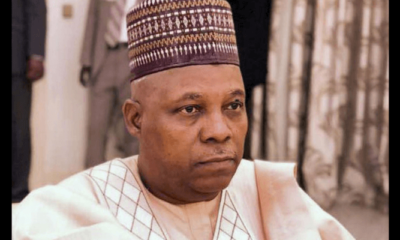

Nigeria’s economy will witness positive changes after painful sacrifice— VP Shettima
-
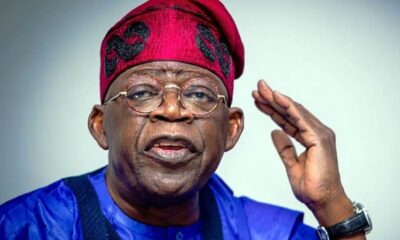

I saved Nigeria from bankruptcy by removing fuel subsidy— Tinubu
-


Behind the News: All the backstories to our major news this week
-


All my tough policy decisions are in Nigerians’ interest— Tinubu
-
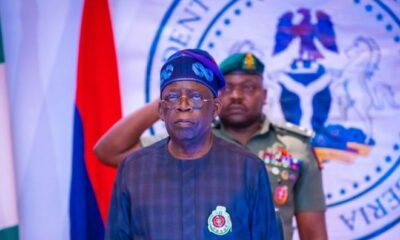

Nigeria: President Tinubu identifies illegal mining as source of terrorism financing
-
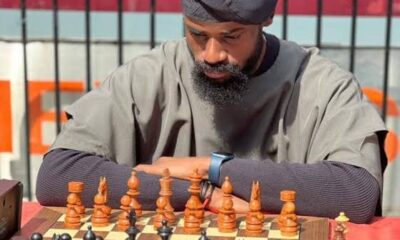

Behind the News: All the backstories to our major news this week
Behind the News
Behind the News: All the backstories to our major news this week
Published
5 days agoon
April 28, 2024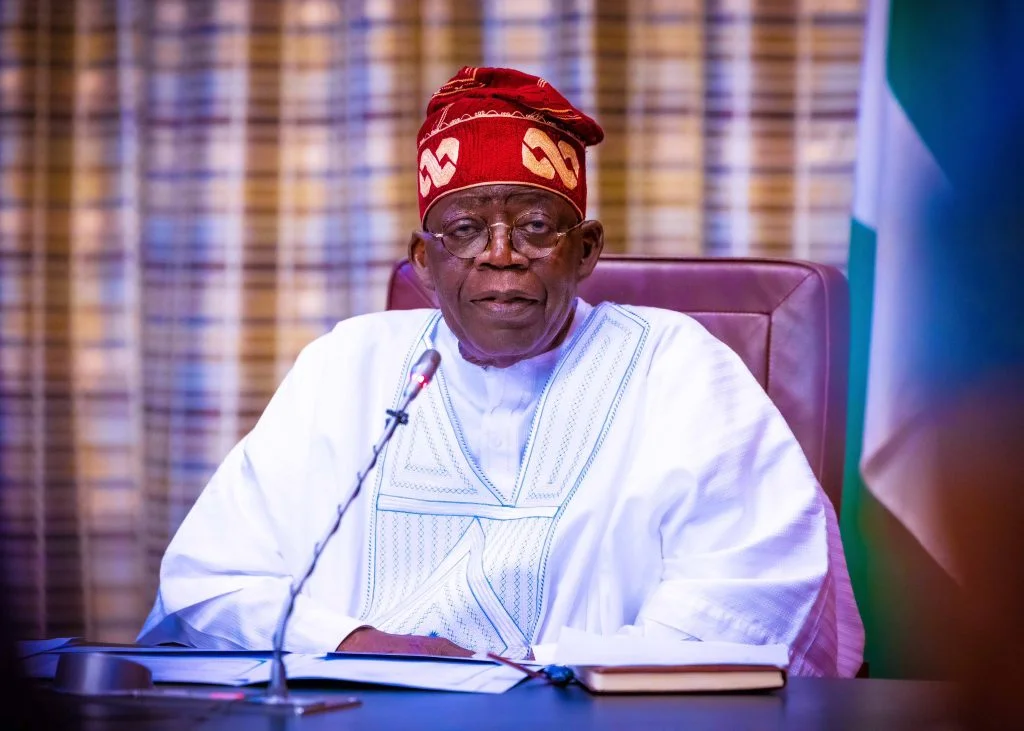
Over the past week, there were lots of important stories from around the African continent, and we served you some of the most topical ones.
Here is a rundown of the backstories to some of the biggest news in Africa that we covered during the week:
1. Renewed Hope: Tinubu’s regular sing-song and the sad reality of Nigeria
During the week in review, Nigeria’s President Bola Tinubu was once again at his rhetorical best when he pronounced the all the tough policy decisions and reforms he has undertaken since coming into office almost a year are have been in the best interest of Nigerians and the good of the country.
Tinubu who spoke during a bilateral business session with Dutch Prime Minister Mark Rutte at the Hague in the Netherlands, said every of his decisions were taken with the interest of his fellow citizens at heart.
He reiterated that his policies which have caused pains and anguish for Nigerians were in their best interest.
“I am a determined leader of my people. I am ever ready to take tough decisions in the best interest of the people, even if with initial pains,” Tinubu said.
“I have and will continue to take the difficult decisions that will benefit our people, even if there is short-term pain,” he added.
But beyond the regular promises of better days ahead by Tinubu and his team, the reality on ground in the country does not seem to align with so much optimism.
The first sign that things were going to be tough was when Tinubu pronounced the end of fuel subsidy in his inaugural address to the nation on May 29, 2023, without as much of a plan to ameliorate the anticipated economic crisis that was to follow.
Despite later attempts to provide some succour and buffers to cushion the effects of the subsidy removal, things have gone from bad to worse with the cost of living rising through the roof.
Inflation has gone up to an all time high of 30.20% according to the Nigeria Bureau of Statistics while prices of basic goods have gone beyond the reach of the average Nigerians, many who find it difficult to provide for their families.
But to President Tinubu, the pains and hardship Nigerians are currently going through will soon be a thing of the past because, according to him, his “tough policies” would yield positive results in the end.
“We have gone through the worst of the storms. I am unafraid of the consequences once I know that my actions are in the best long-term interests of all Nigerians,” he posited.
Nigerians are indeed waiting patiently for the fulfilment of these promises and are looking forward to a time they will go back to living a normal life again!
2. Discriminatory Chinese supermarket meets its match as Nigerian govt shuts mall
A Chinese supermarket located in the heart of Abuja, Nigeria’s capital, ran into hot water when the Federal Competition and Consumer Protection Commission (FCCPC), shut it down following allegations of discrimination against Nigerian shoppers.
Before the action of the government agency, a report had indicted that the supermarket located within the premises of the China General Chamber of Commerce in Abuja, was in the habit of barring Nigerian citizens from shopping in the mall.
Following the exposè which came with video evidence and investigations carried out by the FCCPC turned out to be true, officials of the agency promptly moved in and shut down the mall.
Director for Surveillance and Investigation of FCCPC, Boladale Adeyinka, who led the team, said they took the action was in response to a viral video showing Nigerians being discriminated against and not being able to get into an Abuja supermarket.
“The essence of the surveillance and investigation that we conducted today is to verify the allegations and the content of that viral video,” she told journalists during the exercise.
That was not the first time foreign business ventures have discriminated against Africans in their own country by refusing them their services.
A few years ago, a Chinese restaurant in Lagos was in the news for refusing to serve a Nigerian couple and it took the intervention of the state government for normalcy to return to the outfit after some Nigerian youth decided to vent their anger on the eatery.
Many Chinese, Lebanese and other companies run by foreigners in Nigeria have been found to discriminate against their Nigerian staff and customers but as usual, the powers that be have always turned a blind eye to such allegations, largely because the business owners have their plugs in the right places while the victims are always at the lower rung of the society.
3. Runaway Binance executive reportedly nabbed in Kenya
It was reportedly a bad day in the office for an executive director of global cryptocurrency firm, Binance Holdings Limited, Nadeem Anjarwalla, who had escaped from lawful detention in Nigeria, as he was arrested in Kenya.
Anjarwalla, a British-Kenyan citizen was arrested on arrival in Nigeria on February 26, along with another Binance official, Tigran Gambaryan, on allegations of tax evasion, money laundering and other charges.
But on March 22, Anjarwalla made an audacious escape from a guest house where he and Gambaryan were being held and was promptly declared wanted with the Nigerian authorities engaging the services of Interpol to help track him down.
The manhunt for Anjarwalla was ended when he was arrested in his hideout by a combination of Kenyan police and operatives of the Interpol.
The Kenya Police Service, in a statement confirming the arrest of the fugitive, said the fleeing Binance executive was arrested in “conjunction with the International Criminal Police Organisation (Interpol) and moves were being perfected for his extradition to Nigeria.
But beyond the arrest of Anjarwalla and the embarrassment it caused the country’s security agencies, a lot of questions have arisen from the episode.
Many Nigerians have continued to wonder how he managed to escape from the so-called safe house he and his colleague were being held.
How could Anjarwalla stage such an escape without the active connivance of some security officials who must have had their palms greased?
How did he manage to get a replacement passport to leave the country since his original passport had been seized by the Economic and Financial Crimes Commission upon his arrest?
Questions, and more questions have continued to rise and Nigerians are waiting for answers, if they will come at all.
4. Zambian CSO blames media polarisation for biased reportage
The Executive Director of a Zambian civil society organisation, Chama Mwansa, has blamed the polarisation of the media for biased coverage and reportage in the country.
Mwansa who is the ED of the Chandarika Women and Youths Foundation, in an interview with Zambia Monitor, said the media was balkanized between private and state-owned media outlets which has led to a bias in news coverage.
“The media plays a crucial role in society. Media freedom allows for comprehensive coverage of various perspectives, whether from the opposition or the ruling party,” she said in the interview.
She also harped on the importance of media freedom, freedom of speech, and digital rights in promoting social and economic development, and emphasized on the importance of media partnerships in facilitating coverage of events.
Mwansa’s observations on the polarisation of the media industry in her country can also be replicated in many African countries where the media is gagged and practitioners are made to look like the dregs of the society.
In many African countries, journalists are seen as dangerous species with many of them treated with disdain. Many journalists in different parts of the continent have been abducted, brutalized and killed for just doing their jobs which have constantly raised the question on the safety and freedom of journalists.
5. Al Ahly, Esperance in clash of titans for CAF Champions League trophy
For the fourth straight seasons, two of Africa’s most successful clubsides, Al Ahly of Egypt and Esperance of Tunisia, will clash in the final of the TotalEnergies CAF Champions League scheduled for next month.
Al Ahly which is the current holders of the title and their long-standing rivals Esperance, booked their places in the final in dramatic fashions to earn their places in the final of Africa’s epic football tournament.
Al Ahly cruised past former champions TP Mazembe of the DRC 3-0 in their two-legged semi final tie, while Esperance defeated another former winner, Mamelodi Sundowns of South Africa, running out with a 2-0 aggregate victory.
Al Ahly, winners of the five of the last seven editions of the CAF Champions League, will be aiming for her 12 trophy when they visit Esperance for the first leg in Rades on May 18, while the Tunisian giants will be gunning for a fifth Champions League title, which clearly puts the two teams as the best in the continent.
The second leg will hold in Cairo a week later, which, on paper, gives Ahly a sense of home advantage.
- But however it turns out, there will surely be fireworks as the two teams battle for the glory in the two-legged final and surely, whichever team comes out tops will be the best for the African continent.
Behind the News
Behind the News: All the backstories to our major news this week
Published
2 weeks agoon
April 22, 2024
Over the past week, there were many important stories from around the African continent, and we served you some of the most topical ones. Here is a rundown of the backstories to some of the biggest news stories in Africa that we covered during the week:
Nigeria’s big feat against meningitis
Nigeria made a significant step in its fight against the World Health Organization (WHO) announced on Monday that Nigeria is the first country in the world to give out Men5CV, a “revolutionary” new vaccine. People are getting sick more in Nigeria than anywhere else in Africa. They say that the number of cases each year went up by 50% in 26 African countries that are known to have a high risk of meningitis.
Nigeria is the first country in the world to have given this vaccine which protects against five strains of the meningococcus bacteria. The Vaccine Alliance (Gavi) pays for the vaccine and emergency vaccination operations.
In Nigeria, between October 1, 2023, and March 11, 2024, there was an outbreak of Neisseria meningitidis (meningococcus) serogroup C that caused 1742 suspected cases of meningitis, 101 confirmed cases, and 153 deaths in seven of the country’s 36 states. These states were Adamawa, Bauchi, Gombe, Jigawa, Katsina, Yobe, and Zamfara.
Gavi also pays for the global meningitis vaccine stockpile and helps low-income countries get regular meningitis shots. Nigeria is one of 26 countries in Africa where meningitis is very common. It is in an area called the African Meningitis Belt. The number of meningitis cases reported each year in Africa rose by 50% last year.
Being a serious infection, meningitis makes the membranes (meninges) that cover the neurons in the brain and spinal cord swell up. Viral, bacterial, fungal, and parasite pathogens are some of the things that can cause meningitis. Headaches, fevers, and stiff neck are common signs. Bacterial meningitis is the worst kind. It can also lead to septicemia, which is blood poisoning, and people who get it can become severely disabled or die within 24 hours.
Besides Nigeria’s meningitis vaccine campaign, the international summit on meningitis in Paris will be a big step toward ending the disease as leaders will meet to celebrate progress, discuss problems, and decide what to do next.
Britain /Rwanda migration deal remains stuck
Rishi Sunak’s plans to send asylum seekers to Rwanda took another defeat this week when they were turned down again by the upper house of parliament in Britain. The parliament came up with changes that would slow down the policy but not stop it. The leader of the country thinks this will help his party win the next election.
Last year, the British government said it was going to send thousands of refugees back to the East African country. This was done to stop people from trying to get protection by crossing the English Channel in small boats from France. Part of an agreement worth £148 million is the idea.
Despite a Supreme Court’s ruling against the controversial move, Sunak has pushed to enact the law through parliament, praying that British courts should consider Rwanda a safe place to visit and that people should only be able to appeal in very rare situations. Europeans have become worried about people coming in illegally from the Middle East and Africa these days. As of June 2023, a record 45,000 people had flown in small boats across the English Channel.
Since Monday, when the House of Commons turned down the House of Lords’ second set of plans to change the new laws, they tried again. The House of Lords is Britain’s appointed upper house. But it’s not likely that the move will stop the bill from being passed this week. If it does, it will become law.
Ahead of the elections later this year, Sunak has put a lot of political capital into the Rwanda plan. He says it will help him keep his word to stop small boats carrying thousands of people who are trying to get into Britain illegally.
About 14.4% of the UK’s population, or 9.5 million people, were born outside of the UK in 2021. A record 45,000 people, mostly from France, crossed the English Channel in small boats last year. More than 11,000 people have been here so far this year. Getting rid of illegal immigration is one of Prime Minister Rishi Sunak’s top objectives.
Burkina Faso takes further steps from France
West African country, Burkina Faso has continued its diplomatic stance against former colonialist, France as it expelled three French diplomats allegedly being involved in actions against the government. The West African country, under military rule like five others in the subregion in a letter sent April 16 to the French embassy said that the three diplomats, two of whom were named as political advisers, were told they were not welcome in the country and had 48 hours to leave.
Sources quoted by Reuters said the officials were kicked out because they met with people from the public. There have been five coups in the area in the last three years. Most of them were linked to ties with France. The latest coup in Niger could make things harder for food markets in Nigeria and other West African countries, the World Bank said not long ago.
Around the world, rights groups, and other interest bodies claim that the junta restricts the freedom of speech and is scaring off critics while it tries to deal with a security crisis caused by rebels with ties to Iran and Al-Qaeda.
Last year, the government announced that it had suspended the 2018 military accord with France, though it still wanted support in the form of equipment. France deploys about 400 special forces soldiers in Burkina Faso, which the military government rules, but relations have deteriorated and tensions have soared in recent months.
Burkina Faso is one of the poorest in the world, and over the past ten years, a war that started in Mali and spread across the Sahel has killed thousands of people. People in the country are more against France now than they were a few months ago because they think that France’s armed presence has not made things safer, expelling its diplomatic might just be another low in their relations as the wave against the former European colonialists continues across the subregion.
Nigeria: ‘World beater’ Onakoya sets new chess record
Nigerian chess prodigy, Tunda Onakoya began an attempt at a 58 hours play of the game to surpass the world record of 56 hours, nine minutes, and 37 seconds, which was set by the Norwegian duo of Hallvard Haug Flatebø and Sjur Ferkingstad in 2018. Onakoya has broken the record set in 2018 by 56 hours. He also wants to raise $1 million for his charity, “Gift of Chess and Chess in Slums Africa,” which he has used to help vulnerable children in Africa.
For 60 hours straight, Onakoya played in Times Square in New York City to raise money for the schooling of poor children in Africa as he played from Wednesday morning until early Saturday morning, having been inspired by the huge number of people who wanted to see him succeed.
Within Nigeria, Onakoya is well known for starting the Chess in Slums project in 2018 in Ikorodu, which is on the outskirts of Lagos. Often outcast young people, many of whom don’t go to school and work to support their families, can learn to play chess at the organization with the country having one of the highest rates of child absence from school in the world, with more than 10 million kids of school age not going to school.
The Guinness Book of World Records has not yet confirmed the new record. This process can take up to two weeks. Whatever the case, Onakoya’s accomplishment has already had a big effect, showing that even from “corners of disadvantage,” big changes are possible.
EDITOR’S PICK


Egypt unveils stamp to mark 100th anniversary of relationship with Brazil
The Egyptian Post Board has unveiled a stamp to mark its 100th anniversary of relations with Brazil. The commemorative stamp...


ExxonMobil ‘optimistic’ over Mozambique LNG project
According to a company spokesman on Thursday, ExxonMobil is “optimistic and pushing forward” with its postponed Rovuma liquefied natural gas...


African Union, Google Africa launch campaign to celebrate creative economy
The African Union has entered a partnership with Google Africa aimed at celebrating the continent’s thriving creative economy which has...


Liverpool legend Graham Souness wants ‘selfish’ Salah to leave club
One of the legends of English Premier League club, Liverpool, Graeme Souness, wants Egyptian star, Mohamed Salah, to leave the...


São Tomé and Principe to demand reparations from Portugal
The education and cultural minister of Sao Tome and Principe, an African island nation, announced on Thursday that the government...


Nigeria’s Insurance Corporation raises maximum deposit coverage from N500k to N5m
The maximum deposit insurance coverage levels for Deposit Money Banks has been raised by the Nigeria Deposit Insurance Corporation (NDIC)...


Zambian activist highlights ongoing threats to media freedom on World Press Freedom Day
As the world commemorates World Press Freedom Day on Friday, a youth activist from the Young Women Christian Association (YWCA)...


Nigeria’s economy will witness positive changes after painful sacrifice— VP Shettima
Nigeria’s Vice President, Senator Kashim Shettima, has told Nigerians to look at the bigger picture as the country’s economy will...


Nigeria’s food delivery startup Chowdeck raises $2.5m to optimise operations
Nigeria’s on-demand food delivery startup, Chowdeck, has announced securing the sum of $2.5 million in seed funding that will enable...
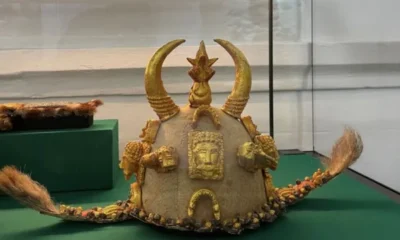

Ghanaians celebrate return of Asante Gold artefacts looted by British
Ghanaians, especially those from the ancient Asante region, have been in joyous mood as they flocked to the Manhyia Palace...
Trending
-

 Tech1 day ago
Tech1 day agoNigeria’s food delivery startup Chowdeck raises $2.5m to optimise operations
-
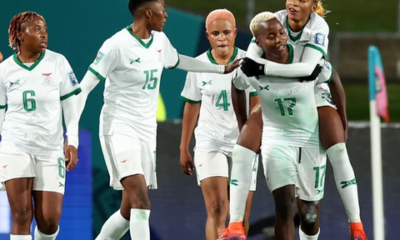
 Sports1 day ago
Sports1 day agoWhy Zambia’s women national team could miss Olympics
-

 VenturesNow2 days ago
VenturesNow2 days agoNigerian banks close over two million accounts
-

 VenturesNow10 hours ago
VenturesNow10 hours agoNigeria’s Insurance Corporation raises maximum deposit coverage from N500k to N5m


